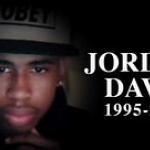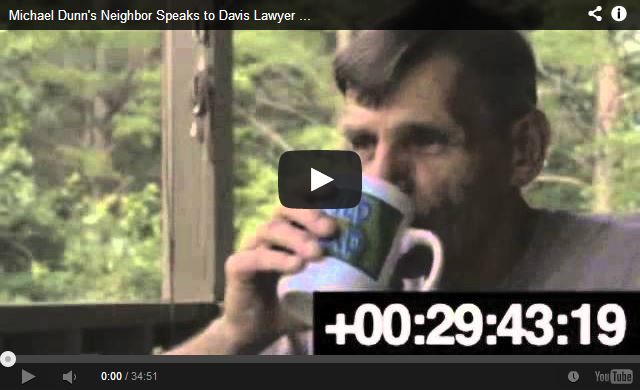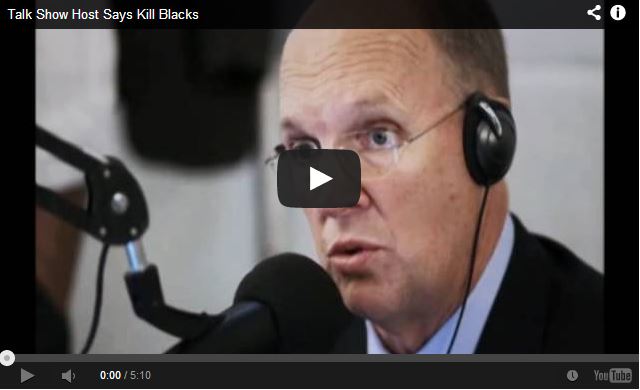Clarence Thomas, Jordan Davis, and America’s 'Sensitivity' About Race

“You Are Not Going Talk To Me Like That”
What happened the night Michael Dunn killed Jordan Davis depends on whose story one believes. Dunn’s fiancé Rhonda Rouen went inside the gas station, while Dunn waited in the car. At some point, Dunn asked the young men in the Durango to turn their music down. Tevin Thompson complied, but turned it back up again when Davis objected
Dunn and Davis began arguing. At some point, Davis pointed his finger at Dunn and said, “Fuck you!” To which Dunn replied, “Are you talking to me?” Another person who walked out of the store heard Dunn say, “You are not going to talk to me like that,” before the shooting started.
The argument reached its climax when Dunn retrieved his gun from his glovebox, pointed it at where Davis was sitting, and started shooting. Tommie Stornes put the Durango in reverse, and sped away. Dunn exited his car and continued firing at the Durango. Stornes stopped in an adjacent parking lot, 100 yards from the gas station. The other three teens got out of the car and checked on Davis, and then returned to the gas station to call for help.
From there, the stories part ways. Witness and expert testimony, however, contradict Dunn’s version of events. There’s no doubt that Michael Dunn killed Jordan Davis. But why did Michael Dunn kill Jordan Davis?
Who is Michael Dunn?
Dunn’s comment to his fiancé that he hated the “thug” music coming out of the Durango hints that even before he encountered with Davis, Dunn was primed to see young black men as dangerous “thugs,” whose mere presence was a threat. Dunn’s jailhouse letters and communications after his arrest cement the picture of Dunn as a man with a deep fear, loathing, and even hatred for young black men
Before the verdict, Dunn’s lawyer said at a press conference that the murder of Jordan Davis was “not about race,” but was instead about what his client would call a “a subculture-thug issue.” Yet, Dunn’s jailhouse letters revealed how much race and “culture” were inextricably linked in Dunn’s thinking.
In a letter from jail, Dunn attempts to draw a distinction between race and “culture.”
“I’m really not prejudiced against race, but I have no use for certain cultures. This gangster-rap, ghetto talking thug ‘culture’ that certain segments of society flock to is intolerable. They espouse violence and disrespect towards women. The black community here in Jacksonville is in an uproar against me — the 3 other thugs that were in the car are telling stories to cover up their true ‘colors.”
The ease with which he leapt from the “thug culture” to “the black community in Jacksonville,” suggests that race and “culture” are intertwined and interchangeable in Dunn’s thinking. How can it be otherwise? Culture comes from people, after all. Damning a culture as inferior is a short step from also damning the people from whom it originated.
Dunn was even more explicit in a letter to his grandmother.
The jail is full of blacks and they all act like thugs. This may sound a bit radical but if more people would arm themselves and kill these (expletive) idiots, when they’re threatening you, eventually they may take the hint and change their behavior.
In other letters, Dunn states that the jail population is “90 percent black,” as if to bolster his point about blacks and “thug culture.” He complains of being locked up with “these animals,” that the “liberal media” is painting him as the bad guy, and that the press is “ignoring black on black crime,” and persecuting him because he’s white. In a phone call with Rouen, Dunn even compared himself with a rape victim, complaining that the police were blaming him for the shooting when he was only defending himself.
In a letter to Rouen, Dunn worried about getting a mostly black jury.
The fear is that we may get a predominately black jury and therefore, unlikely to get a favorable verdict. Sad, but that’s where this country is still at. The good news is that the surrounding counties are predominately white and Republican and supporters of gun rights.”
Even without knowing Dunn’s politics, his thinking aligns with perfectly tea partiers who believe that whites are more persecuted than blacks.
During the trial, Dunn’s attorney called a handful of character witnesses who testified to Dunn’s “calm demeanor” and said they’d never known him to be violent. Dunn’s attorney said during a press conference that his client had never been enraged or accused of racism. In response, the Davis family’s attorney released a videotaped statement from Charles Hendrix, who was Dunn’s neighbor for eight years.
In the 35-minute interview, Hendrix describes Dunn’s violent behavior, insurance fraud, cocaine use, and bragging about putting a hit on someone. Hendrix said that some of Dunn’s former wives came to him with bruises and swollen lips, saying that Dunn had put guns to their heads and threatened to kill them. Two of Dunn’s wives told Hendrix that Dunn threatened to get them deported, and said they would never see their children again.
But what’s most relevant to the murder of Jordan Davis is the portrait of Dunn as a man who could become enraged and violent when someone said, “No,” to him.
He had an air, where he was light and friendly and he laughed, but uh, if you disagreed with him he would get boisterous, and try to intimidate people with his size or his voice. Very arrogant. There wasn’t much he wouldn’t do to get his way.
Hendrix also portrayed Dunn as someone who was armed and spoiling for a fight.
Did I ever hear him say he wanted to shoot somebody? Not directly. But several times he did make comments like “I can’t wait for somebody to try something with me when I have my gun!” I’m the type of person that that’s the last thing that I would be contemplating. I don’t want to have a confrontation with anybody when I have a gun, anybody that does is predisposed, in my opinion, to kill somebody. If you’re looking for confrontations just because you have a gun? There’s no question in my mind that people that are looking for confrontations when they have a gun, Someday, they’re going to find it. When I heard about this situation with Michael Dunn I was like “There you go, I KNEW it. Sooner or later he was gonna kill somebody.”
“Thug” Culture and Racial Sensitivity
Dunn’s attorney is right and wrong. The murder of Jordan Davis, and Michael Dunn’s trial for Davis’ murder are both about culture, but they’re also about race. Testimony about his “calm demeanor” aside, the level of murderous rage and violence Michael Dunn exhibited doesn’t come out of nowhere. Their seeds are planted and nurtured until they yield deadly fruit.
Michael Dunn arrived at the gas station already armed with a worldview formed and informed by two different right-wing cultures or subcultures. The first, as Paul Waldman writes, is an American gun culture where, “so many gun owners have in their heads a dangerous fantasy about what the world is like and what role they play in that world.” They are the one’s who believe it’s imperative that they can take their guns almost anywhere — churches, bars, coffee shops, etc. — because they believe violence is likely to happen anywhere, and they are the only ones who can stop it.
There’s also a subculture on the American right, that’s closely related to the gun culture, in which the fantasy of killing urban minorities in self defense is prevalent. It’s not secret or hidden, either. It manifested most recently in the conservative smear campaign against Trayvon Martin, designed to paint Martin as a drug dealer and violent “thug,” who probably got what he had coming to him. It slipped into the mainstream of conservative media in rants like this one from Neal Boortz (the same guy who said Katrina cleared New Orleans of human debris) about crime in Atlanta:
This town is starting to look like a garbage heap. And we got too damn many urban thugs, yo, ruining the quality of life for everybody. And I’ll tell you what it’s gonna take. You people, you are – you need to have a gun. You need to have training. You need to know how to use that gun. You need to get a permit to carry that gun. And you do in fact need to carry that gun and we need to see some dead thugs littering the landscape in Atlanta. We need to see the next guy that tries to carjack you shot dead right where he stands. We need more dead thugs in this city. And let their — let their mommas — let their mommas say, “He was a good boy. He just fell in with the good crowd.” And then lock her ass up.
It’s no coincidence that in one of his jailhouse letters Michael Dunn almost echoes Boortz’s call for more “dead thugs” “littering the landscape.”
Clarence Thomas complained that Americans are too “sensitive” about race. Michael Dunn was sensitive about race and ready for a confrontation. He parked right next to the Durango, after complaining about the “thug” music pouring from it, instead of choosing a parking space further away. He didn’t move his car or join his fiancé inside, to escape the music or a potential confrontation. He made sure there would be one.
Davis defied Dunn’s request to turn the music down, and cursed him out as well. It was too much that this “thug,” in Dunn’s eyes, dared to say no to him, and then “dissed” him so loudly and publicly. This “thug,” this “animal,” was not going to talk to Michael Dunn that way.
If Michael Dunn felt threatened, it’s because he was primed to see “dangerous black kids” everywhere he looked. But fear wasn’t what drove Michael Dunn to shoot nine to ten bullets at a fleeing car full of unarmed teenagers.
The only thug at that Jacksonville gas station the night Jordan Davis was murdered was Michael Dunn — armed, and empowered by right-wing subcultures, and nurtured on deadly brand of racial “sensitivity.”


